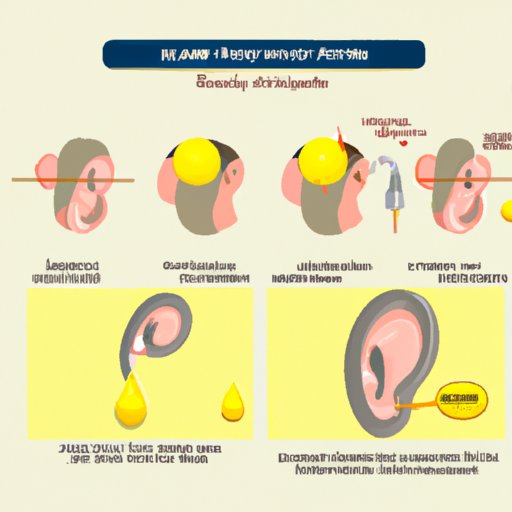
I. Introduction
Earwax build-up can be uncomfortable, affect hearing, and cause other issues. There are safe and effective methods to remove earwax at home without putting yourself at risk of injury. This article covers the traditional method, earwax removal drops, ear irrigation, olive oil, hydrogen peroxide, and seeking professional help.
II. The Traditional Method
The traditional method of using cotton swabs is not recommended by medical professionals due to the risk of damaging the ear canal. Alternative methods for removing visible earwax from the outer ear include using a warm washcloth or a rubber bulb syringe filled with warm water.
III. Earwax Removal Drops
Earwax removal drops work to soften and loosen earwax. It is important to use them safely and effectively to avoid causing further issues. Recommended drops include Debrox, Murine, and Similasan Ear Relief.
IV. Ear Irrigation
Ear irrigation involves using a syringe or bulb filled with warm water to flush out earwax. This method is not recommended for those with a history of ear infections or ear surgery, and it is important to use caution to prevent damage to the ear.
V. Olive Oil
Olive oil can be an effective method for softening and loosening earwax. However, it is important to use it safely to avoid any side effects. Use only a few drops and leave it in for a few minutes before flushing it out with warm water.
VI. Hydrogen Peroxide
Hydrogen peroxide can also help to break down and remove earwax. It must be diluted with water to avoid any damage to the sensitive ear canal. Using a few drops once or twice a week is recommended.
VII. Seek Professional Help
It is necessary to seek professional help when earwax blockage causes pain, discomfort, or hearing loss. A medical professional can safely remove earwax using specialized tools. Be sure to find a reputable ear doctor and prepare for the appointment.
VIII. Conclusion
Keeping your ears clean and healthy is important. Use a proactive approach in cleaning out earwax, and seek medical attention when necessary. Additional resources or references for readers who want to learn more about earwax removal and ear health include American Academy of Otolaryngology-Head and Neck Surgery, Centers for Disease Control and Prevention, and Mayo Clinic.





